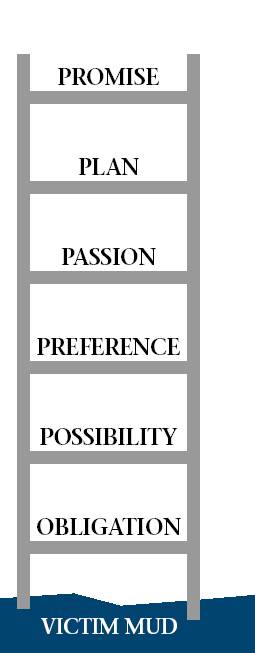The
Power of Your Word
 |
 |
The Power of Your Word
As a tool for rising out of the mud of victim-hood, we can use an
imaginary “ladder of powerful speaking.” On this ladder are six “rungs”:
obligation, possibility, preference, passion, plan, and promise. Each rung
represents a certain type of speaking, from the least powerful (obligation) to
the most powerful (promise). At any
moment, we “stand” on one of these “rungs”—that is, our speaking
exists on one of these levels. Moving “up the ladder”—speaking less in
terms of obligation and more in terms of promise—is a way to increase our
personal effectiveness. More details about each rung on the ladder of powerful
speaking follow the illustration on the right.
Listen for obligation
Obligation is the bottom rung of the ladder. When someone uses the
words, “I should, I have to, I must, I ought to, someone better, they made me,
someone should, or I had to, then she is speaking out of obligation. People who
perceive themselves as victims often speak at this level. Since they see
themselves as pawns of circumstance, they pretend they have no control over
their lives. When speaking this way, what these people are actually lacking is
influence over their lives.
Speak about possibilities
The next step up the ladder of powerful speaking is possibility.
When we use phrases such as I might, I’ll consider, I could, maybe I will, or
I hope, we’ve made a small but significant step out of the quicksand of
obligation.
Opening up possibilities for our lives is far more energizing and
exciting than feeling obligated. One of the main differences is that obligation
puts other people in charge of our lives. Possibility, like all the rungs above
it, puts us back in charge. While possibility is more freeing than obligation,
some cautions are appropriate. First, we can be careful not to fill up our
speaking, and therefore our lives, only with possibilities. Speaking is a finite
commodity. We can do only so much of it. The more we fill our lives with one
level of speaking (like possibility), the less space we have for other levels. A
person who is always talking about what he can accomplish someday, may never get
around to doing anything. The second caution concerns hope. Many wonderful and
inspiring stories revolve around people’s hopes and dreams. These stories have
their value and their place. However, when they take the place of promising,
planning, and action, they can be deceptive narcotics. Dreams can be so
seductive and so compelling
Speak about preferences
“I prefer to” and “I want to” are common expressions at the
next level of speaking—preference. It is natural to move from considering a
possibility to declaring a preference for doing it. We can also be cautious
about overusing this rung of the ladder. Sometimes, people say they want to do
something, but even after talking about it at length, never get around to doing
it. Stating our preferences indicates that we have thoughts and feelings that
count. It means that we can envision something other than the status quo. This
stance is an opening to consider the next step—passion.
Speak about passions
This rung of the ladder can be exciting. Our emotional energy is
charged and our enthusiasm is heightened. Our words have more punch and our
speaking is more animated. When people hear passion in our speaking, they
realize that we have a great deal of personal energy invested in an idea.
There is a catch: No matter how much energy we have, no matter how
much enthusiasm and excitement we generate, not much is likely to happen until
we climb to the next and even more powerful rung of the ladder. Not much is
likely to happen until we translate our energy into something more
concrete, like a plan. Passion can be compared to the fuel in a rocket
ship, while planning is like the guidance system. All the fuel (passion) in the
world won’t help the rocket stay on course if the guidance system (plan) is
not functioning properly. Passion alone can send us flying off in the wrong
direction.
Speak about plans
We can begin to turn our passion into a reality by speaking about a
plan. A plan, especially if it is written, helps ensure that we’ll back up our
words with action. A plan gives purpose and direction to our passions. Effective
plans lay out the specific steps we’ll take to achieve a goal. The guidelines
for Intention Statements on page 18 explain how to do this. Brilliant ideas die
when plans are not designed to keep them alive. A goal that comes with a
definitive plan is far more likely to be reached than a goal with no plan.
Speak your promises
To reach the top of the ladder, we first make a promise. When we
are absolutely committed to an
action, we say the words I will, I do, I promise.
Promises are plans backed by an ironclad commitment. Promising can
help us take the lid off our potentials. We can free ourselves of the
self-imposed barriers that limit our participation in the world. Whenever we
speak, we have the option of moving up the ladder of powerful speaking all the
way to the top rung, to promise. It’s perfectly OK not to move up the ladder.
It would be foolish to promise
everything. As we listen to ourselves speak, we can just pay attention to which
rung of the ladder we’re standing on. Then we can decide if moving up the
ladder makes sense. When it comes to promising, most of us do not even come
close to our limits. We are capable of far more than we’ve ever imagined. We
can free ourselves of the artificial barriers we’ve used to limit our
participation in the world. One path to a rich, rewarding life is to make
promises that stretch us to meet our potentials.
Tribute.
Another powerful source of learning about integrity and our Word: The Landmark Forum